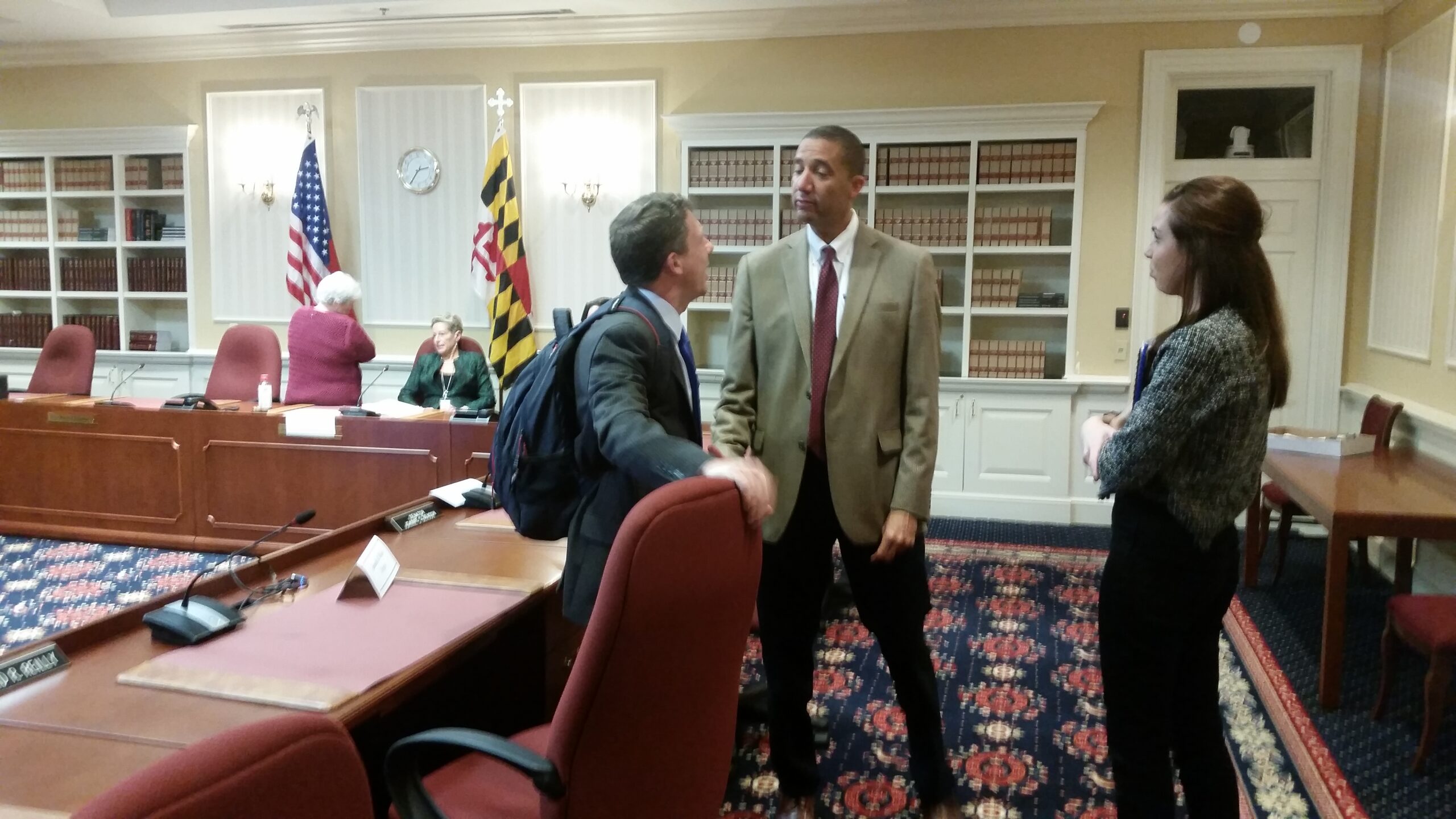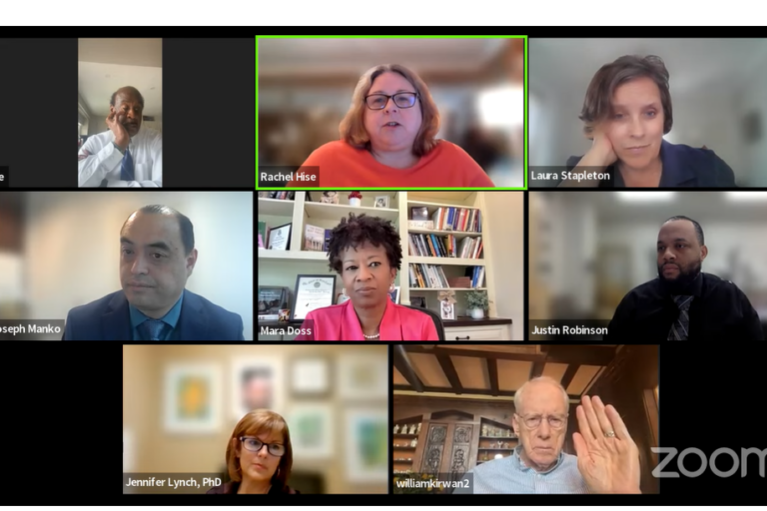Tempers Flare Over School Reforms; Kirwan Urges Hogan to Address Panel

Of all the measures the Maryland General Assembly took this year to bolster the work of the so-called Kirwan Commission, one requiring quick action formed a work group to study how two key state education agencies would implement the commission’s eventual recommendations.
Created by statute, the Workgroup to Study the Maryland State Department of Education and the Maryland Higher Education Commission held its first meeting in Annapolis Monday afternoon.
It didn’t go so well.
In fact, the meeting served as a reminder of the tensions over the Kirwan plan between Gov. Lawrence J. Hogan Jr. (R) and his administration and the Democrats who control the General Assembly. While the Kirwan Commission is putting the finishing touches on its proposal to improve public education over the next few weeks, Hogan has been criticizing its likely reliance on tax hikes to fund a series of reforms and has announced his plans to work to defeat it.
Stung by Hogan’s increasingly vocal skepticism of the commission plan, William E. “Brit” Kirwan, the former University System of Maryland chancellor who leads the reform effort, has invited the governor to address one of the panel’s upcoming meetings – there are three more scheduled between Wednesday and Nov. 21 – telling the governor that he and his fellow commissioners “would benefit greatly by hearing directly from you.”
Hogan has yet to respond to the invitation.
The timing of the workgroup meeting Monday to discuss how the two state education agencies would implement the Kirwan plan was purely coincidental. But it served as a reminder of what’s at stake and the Hogan administration’s resistance to the plan.
The meeting opened with one of the legislators appointed to serve on the panel, House Majority Leader Eric G. Luedtke (D-Montgomery), accusing the Maryland State Department of Education of failing to publicize the meeting in a proper or timely fashion, as required by open meetings laws. State Education department officials said they announced the meeting on the agency’s website on Friday – but it wasn’t displayed prominently and there apparently was no other public announcement of the meeting.
There were only a handful of people in the Senate committee hearing room where Monday’s session was taking place.
“No one seemed to know this meeting was occurring,” Luedtke said.
State education officials apologized for not listing the meeting on the General Assembly’s website, and as Dr. Karen C. Salmon, the state school superintendent who was chairing the meeting noted, “We are live-streaming, of course.”
Next, Luedtke sharply criticized Salmon for writing to General Assembly leaders asking that the workgroup be given an extra six months to release its mandated report, from Dec. 31 to June 30, 2020 – without discussing the matter with the other members of the panel.
“It was just my concern about being able to do a quality product in a timely fashion,” Salmon replied.
Then, Luedtke suggested that Salmon being picked to lead this workgroup represented “a fundamental conflict of interest,” because the panel would be examining her agency’s performance and its ability to accommodate whatever mandates are advanced by the Kirwan Commission and ratified by the legislature.
Salmon answered defensively, noting that the membership of the work group was appointed jointly by Hogan, House Speaker Adrienne A. Jones (D-Baltimore County), and Senate President Thomas V Mike Miller Jr. (D-Calvert).
“I don’t think it’s a conflict of interest,” she said, “because we are going to have an open discussion here.”
“I respectfully disagree,” Luedtke replied.
When Luedtke then suggested that Hogan insisted that Salmon chair the workgroup, a top Hogan aide serving on the panel, Keiffer J. Mitchell Jr., jumped in to say that Salmon was the consensus choice of Hogan, Jones and Miller – a contention later confirmed in an email from Yaakov Weissmann, Miller’s chief of staff.
Luedtke remained unconvinced, but the meeting proceeded anyway. In the minutes that followed, members of the workgroup agreed on some of the questions they hope to answer in the weeks ahead. Among them:
How do the agencies’ current staffing levels compare with previous years? What kind of resources do the Education Department and the Higher Education Commission need to implement the Kirwan plan? Do the agencies have adequate staffing and do they require internal organizational changes to meet the needs of the Kirwan reforms?
“We need to quantify, through Kirwan, the additional responsibilities that we’ve created,” said state Senate Education, Health and Environmental Affairs Committee Chairman Paul G. Pinsky (D-Prince George’s), another member of the workgroup.
Salmon said the panel should also determine whether her agency and the Higher Education Commission have the right kind of data systems to properly analyze test scores, spending patterns and other information that the Kirwan reforms will require.
“There’s all these things within systems that I’d like to look at and analyze,” she said.
The panel’s meeting lasted half an hour Monday. Salmon said the workgroup’s next session would be on Nov. 19, but Luedtke cast doubt on what would happen next.
“Frankly there’s not a lot of trust [among lawmakers] in this process,” he said.
Searching for ‘common ground’
Meanwhile, it isn’t clear whether Hogan will accede to Kirwan’s request to attend one of his panel’s meetings.
“Based on reports in the media, it appears that you have some concerns about the Commission’s policy recommendations and the associated costs,” Kirwan wrote to Hogan on Friday. “Before we complete our work, the Commission would benefit greatly by hearing directly from you. We hope that such a session might enable us to find common ground on how we can ensure that all Maryland students have access to a high quality education and that the state is producing the quality of workforce that will enable it to sustain a vibrant and global competitive economy.”
The commission is scheduled to meet on Wednesday and on Nov. 12, before voting on final recommendations on Nov. 21.
An analysis done for the commission concluded that less than 40 percent of Maryland’s current high school graduates meet college and career readiness standards.
But the proposal would be pricey. A working group that met over the summer to rewrite the state’s education funding formulas to incorporate the commission’s policy recommendations came up with a plan that would require state funding to steadily increase over the next decade until an additional $2.77 billion in state aid would go to schools in 2030. County budgets would also increase during that time period, up to a cumulative $1.23 billion annually.
The proposed funding formula aims to address funding inequities in Maryland schools by directing additional state aid to schools and districts with high populations of students living in poverty or requiring additional resources.
But the increased state funding would prompt additional matching funds from counties, and some county leaders have expressed concern about their ability to generate the necessary funds. While some counties already pay more into their educational systems than the funding change would require, others would face dramatic increases; the city of Baltimore’s local education funding would have to double under the plan, though lawmakers have said they’re looking at ways to blunt the impact.
Hogan has dubbed the education reform groups as the “Kirwan Tax Hike Commission” and alleged that lawmakers are not being forthright about how new programs would be funded. His budget secretary, David R. Brinkley, sits on the commission and funding workgroup, and has expressed similar concerns.
At Wednesday’s commission meeting in Annapolis, members will be briefed on the workgroup’s funding formula recommendations.
In his letter urging Hogan to attend a commission meeting, Kirwan wrote, “We will adjust our agenda according to your schedule.”





 Creative Commons Attribution
Creative Commons Attribution